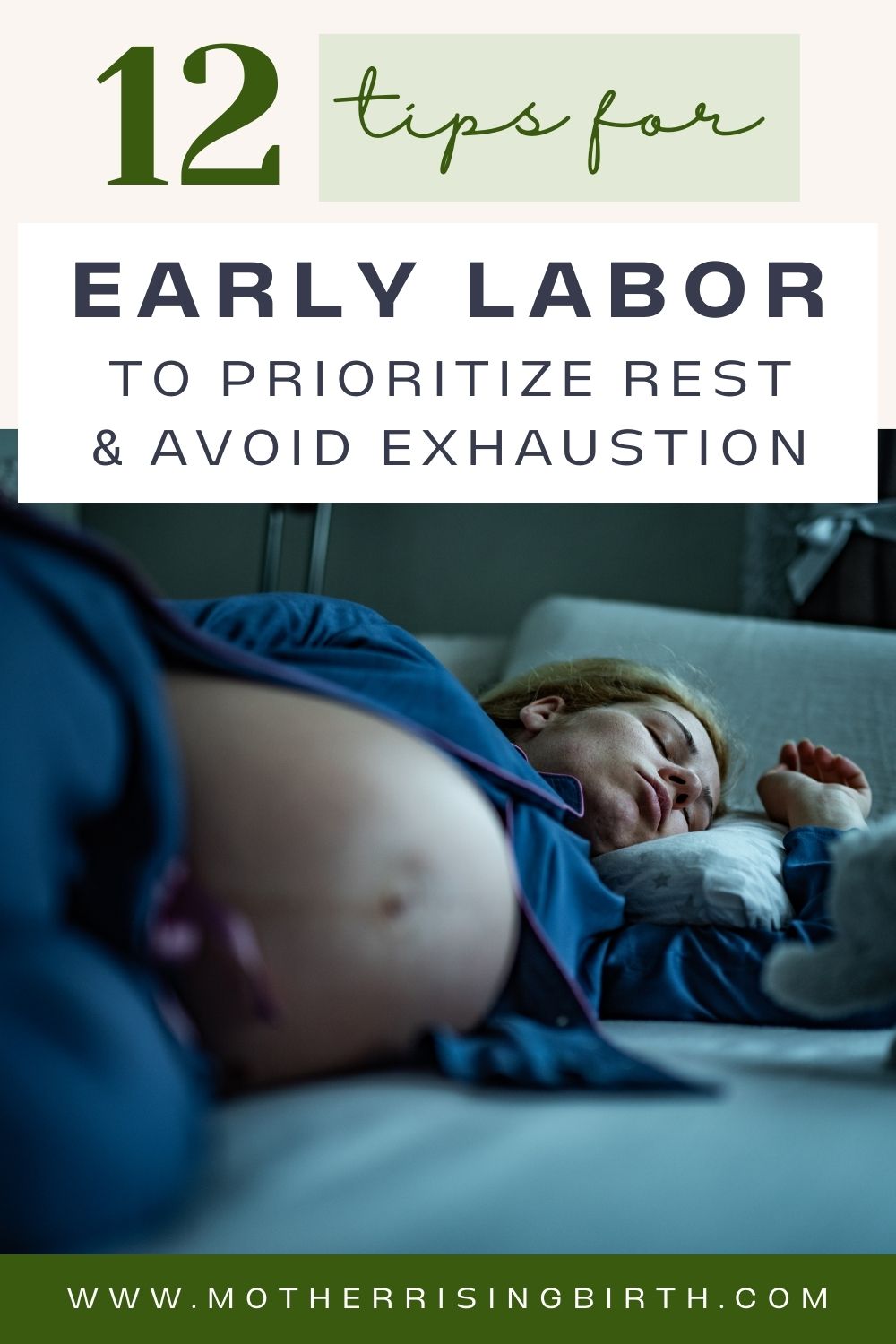One of the best tips for early labor is to prioritize rest in order to avoid exhaustion in the later stages of labor. Why is prioritizing rest important? First time moms expect to struggle with the pain of labor, but are surprised at how much exhaustion in labor is a struggle. In my experience, one of the biggest reasons women ask for an epidural is because of exhaustion!
Everyone gets exhausted during birth, even those having shorter labors. Exhaustion during labor comes from end of pregnancy fatigue, labor hormones, lack of sleep, the emotional ups and downs of birth, and physical exertion during labor. Exhaustion is to be expected, however, there are many things new parents can do to prioritize rest in early labor to minimize exhaustion in the later stages of labor.
On This Page
7 minute read
↓What is early labor?
↓How long is early labor?
↓Tips for Early Labor to Prioritize Rest
↓Ignore Labor
↓Understand Prodromal Labor
↓Spend Early Labor at Home
↓Rest is Best
↓Eat and Drink Freely

What is Early Labor?
Early labor is the beginning of the first stage of labor. The first stage of labor is the part of birth that comes before pushing, when women experience strong contractions. These contractions rotate and bring baby down through the pelvis, while simultaneously opening the cervix.
In early labor, parents can typically walk and talk through their contractions and mostly carry on with their normal life. Contractions are shorter, around 30 seconds long, and around 5-7 minutes apart. Parents usually feel excited, nervous, and probably a bit confused. It’s normal to be confused because early labor can be very similar to end of pregnancy symptoms. Often parents didn’t know they were in early labor until labor progresses further.
How Long is Early Labor?
Early labor can last for many hours, only a few hours, or can be skipped entirely. The typical first time mom will spend a long time in early labor, as the whole process takes somewhere between 12-24 hours. Some women report being in early labor for days, although that sounds like prodromal labor to me. More on that later.
12 Tips for Early Labor to Prioritize Rest and Avoid Exhaustion
When considering tips for early labor, there are many things to do or not do that will conserve energy for the “marathon” ahead.
Ignore Labor
One of the best tips for early labor is to (try to) ignore labor. Understandably, many parents are so excited for baby’s arrival that as soon as signs of labor are noticed, everything revolves around “being in labor”. Being in labor or trying to be in labor is exhausting, all consuming, and ultimately not the best way to spend time.
Keep Daily Routine
If possible, go about the day as if early labor is not happening. A watched pot never boils, right? If you planned to go to lunch with a friend, consider keeping the appointment. If you need to pick something up at the grocery store, go ahead and get that done. If you have a to-do list a mile long, try to mark off from that list. Keep living life as if early labor isn’t happening.
Stop Timing Contractions
Timing contractions is helpful to get a snapshot of labor progress at one point in time to be able to compare it later in labor when things progress. Unfortunately, parents often spend their whole early labor experience timing contractions, likely because it helps them to feel more in control in an unknown situation. However, timing contractions becomes emotionally exhausting so it’s best to use this tool to get snapshots throughout the day.
Understand Prodromal Labor

Prodromal labor is different than early labor (see above). Prodromal labor is when parents are experiencing signs of labor that can’t be ignored, continue for hours and hours, without any labor progress. This is an exhausting situation! If you find yourself in this position make sure to read how to progress prodromal labor ASAP.
One of the most helpful things to do when navigating prodromal labor is to try to relax. Use the tub, shower, dimmed lights, massage, etc, to prioritize rest and relaxation. Relaxing yourself can relax an overstimulated uterus, which is probably what is happening.
Some moms get IV narcotics in early labor or when experiencing prodromal labor. The reasoning is because they are exhausted, and understandably so. An alternative to this is wine, which has a similar effect, but with less side effects like nausea, vomiting, feeling “high” and “out of it”. Some parents find these IV narcotics to be frustrating because they feel drunk/high but still need to cope through contractions.
Spend Early Labor at Home
Unless medically indicated, the best place to be in early labor is at home. Most care providers recommend going to the hospital later in active labor, when contractions are well established and long, strong, and close together. Parents are more comfortable at home, and because of birth hormones are more likely to progress in labor when at home.
411 Contraction Rule
Many parents use the 411 contraction rule to ensure early labor is spent at home and not at the hospital. When contractions are four minutes apart, one minute long, and this has been going on for one hour – it’s time to go to the hospital.

Rest is Best (one of the best tips for early labor!)
In early labor if parents have to choose between trying to “be in labor” or rest, I will usually choose rest. Rest is best!
Stay in Bed
If it’s 3 am and you’re noticing signs of early labor, don’t get out of bed. Instead, see if you can go back to sleep, sleep between contractions, or just rest. If it’s truly labor, odds are you aren’t going to sleep the next night which means tonight’s sleep is extra important. Give your pushing self the gift of rest by staying in bed at 3 am during early labor.
Let Partner Sleep
Similarly, if it’s 3 am and you’re noticing signs of early labor, don’t wake up your partner. Just like you, they need sleep too and will likely be awake the following night as well. Help your partner conserve their energy by prioritizing rest and letting them sleep
Power Down
One way to encourage the body to rest, despite waking up at 3 am with contractions, is to power down electronics. Don’t turn on the lights, tv, phone, tablet, etc. Electronics stimulate the brain, but we’d like the brain to rest too. Resist the urge to get on the internet to google “what to do in early labor“.
Take Naps and Lie Down
If it’s not 3 am but during the daytime, it’s still important to prioritize rest. Make sure to take a nap(s) during the day to build energy and feel your best. If it’s too hard to fall asleep, just lie down. Listen to relaxing music, nature sounds, or an upbeat audiobook. Putting the feet up and mentally unplugging does wonders.
Eat and Drink Freely
Another way to avoid exhaustion in early labor is to continue to eat nourishing foods and stay hydrated. Just like running a race, a laboring mother will need sustenance throughout her entire journey. Studies show that unmedicated women in labor should eat and drink freely throughout her entire birth experience.
Snacks for Labor
Plan ahead to have the best snacks for labor on hand to keep the body energized. Parents typically choose lighter, easily digested foods like soups, fruit, granola bars, and honey sticks.
Stay Hydrated with Electrolytes
A good rule of thumb is to make sure a laboring woman should be drinking 8 ounces of fluids every hour. Water is a wonderful choice, and it may be helpful to alternate water with something that has electrolytes in it too. Gatorade can often be too acidic in labor, so electrolyte cubes are often a hit in early labor.

What are your best tips for early labor?
Leave a comment and let me know your best tips for early labor to prioritize rest and avoid exhaustion. I’d love to hear from you!

